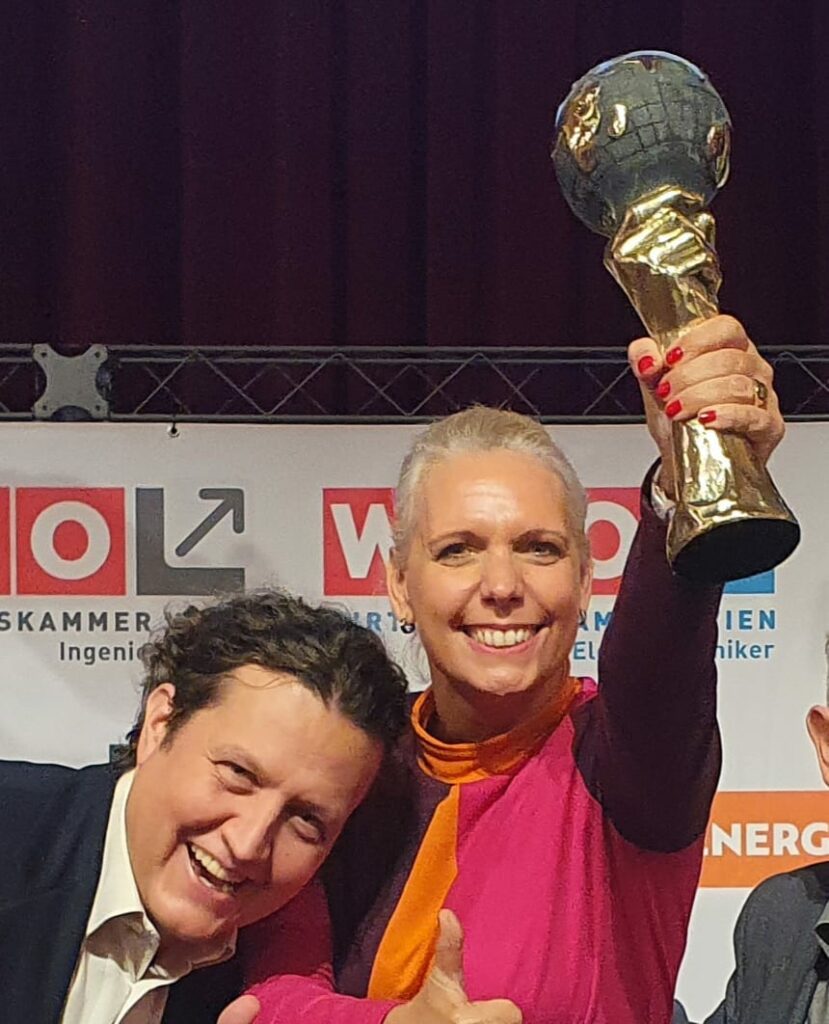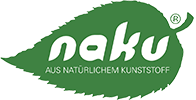
15 years of NaKu – 15 years of bioplastics
From the pioneer and visionary to the Energy Globe Award
How it all began – the first thoughts
When the children of Ute and Johann Zimmermann were still small (Moritz is now in the middle of high school, Johann Jr. is already studying), the parents had to justify how much single-use plastic is actually disposed of with the waste in a family of four and why everyone is participating in a system that is so clearly going in the wrong direction. So the search began to see if there really was no alternative.
As early as 1999/2000, Johann Zimmermann dealt with the then new plastic (bioplastic based on lignin) for the first time. Both Zimmermanns were fascinated that there is a 100% bio-based renewable material, even if it stunk and stuck and it was difficult for specialists to get anything out of the machine.
The path to self-employment and founding a company
Since 1994, Ute and Johann Zimmermann have always wanted to start their own company. The decisive factor in finally taking this step was a few impulses from friends and Johann Zimmermann’s boss at the time, who knew about this long-standing wish.
Finding the name and the first product
No sooner said than done – the question now arose as to what the company should be called at all? Ute and Johann Zimmermann decided very early on to use the core term “natural plastic” – today’s short form “NaKu” – because organic was too inappropriate for them. At that time there was no clear classification of bioplastics and no definition of how these plastics should be called.
The name was found, now only a first product made of bioplastic had to be developed. In short – the NaKu-Sackerl, which is known today, was born. In the course of the following years, more and more new bags made of bioplastics were added to this first variant. On the one hand as an organic carrier bag in different sizes and thicknesses, on the other hand for special purposes in the household such as the organic freezer bag, the organic fresh-keeping bag or the organic garbage bag. Innovations such as the garment bag made from bioplastics for cleaning shops or the NaKu planting bag followed.
The first years
It’s not always easy to be a visionary and pioneer. The years up to 2017 were challenging for NaKu. NaKu was repeatedly attacked with the same arguments: Bioplastics are not organic at all, bioplastics are not renewable raw materials. NaKu is just greenwashing. Bioplastic is made from genetically modified plants, etc.
There was a lot of resistance to this new material, especially in the plastics industry. Even if the general public has never seen it so black and white, but more as gray, the question was very quickly asked within the plastics industry: If THE people at NaKu make the good plastic, then what do we do? But there were other reservations about bioplastics as well. Ute Zimmermann reports: “The use of biodegradable products requires that you deal with product consequences. It assumes how seriously I take sustainability. For me, is it a fig leaf for better marketing, or is it part of my corporate philosophy.”
Johann Zimmermann says from experience and many conversations: “The price was and is the main reason for deciding against a product made of natural plastic. If our materials cost the same as conventional PET, it would be obvious for our customers to opt for the bio variant. This also ensured that many people with whom we developed products together made different decisions.”
With perseverance and trust in your own products to success
But it wouldn’t be Johann and Ute Zimmermann if they had let this headwind stop them. The products already mentioned were persistently developed, followed by recyclable and compostable bottles made of PLA.
Already in 2009 a Study on the freshness function of the NaKu bags carried out and it could be proven that food stays fresher longer – nowadays a topic in terms of food waste that is more topical than ever.
In the years that followed, many prizes were won for NaKu products made from bioplastics, such as Genius, Clusterland Award, ÖGUT environmental prize, Lower Austrian innovation prize, DAPHNE environmental technology prize, and many more. mentioned.

The “coronation” in 2021 was the Victory at the Energy Globe Award Austria in the Earth category with the NaKu plant bag made of bioplastics, which was developed together with the HBLFA Gartenbau Schönbrunn for the Book for Trees project in Kenya.
NaKu in the Corona years
The last few years, shaped by Corona, have been a real challenge for every company. However, NaKu has used this time for time-consuming new product developments and customer projects. A technically particularly challenging customer project presented the Replacement cartridge made of bioplastic for a sustainable reusable jar (made of wood and glass) for the natural cosmetics from freemee cosmetics NOT PLASTIC WATER with WILDALP developed. A unique product, spring water from the Gesäuse, filled in a special NaKu PLA bottle. This makes plastic-free drinking pleasure possible for the first time.
And so it continues
Johann and Ute Zimmermann have been giving lectures at universities, schools and congresses on the subject of bioplastics for many years. Clarifying and passing on their many years of bioplastics knowledge is particularly important to them. In the meantime, there are even more dives on the market fake organic bags – a clear deception of retailers who, due to the plastic bag ban, are only allowed to issue light and degradable carrier bags made of bioplastics. Clarification and information are also required here, and corresponding information videos have been produced.
Very intensive work is being done on the NaKu Double Loop and on positioning bioplastics and their recyclability better. Previous test runs to recycle bags made of bioplastics have been positive. The first test productions with already recycled PLA for bottles were also promising.
“For us, the combination of nature and technology is not a contradiction, but an important basis for our work. The organic idea should not stop at the packaging and waste should remain in the generation that causes it.
After all, plastic can also be natural.”
DI Johann Zimmermann
